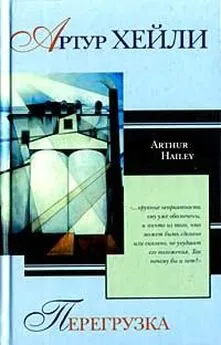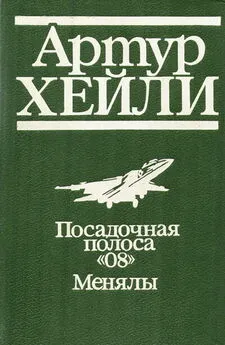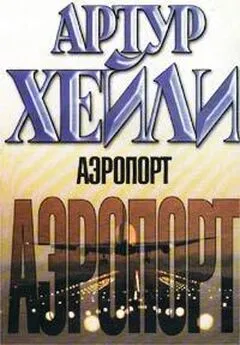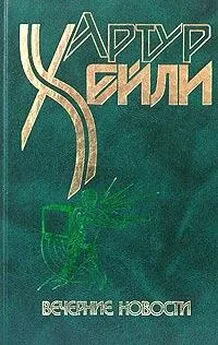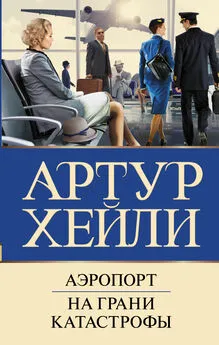Артур Хейли - Аэропорт / Аirport
- Название:Аэропорт / Аirport
- Автор:
- Жанр:
- Издательство:неизвестно
- Год:2020
- Город:Москва
- ISBN:978-5-17-121013-7
- Рейтинг:
- Избранное:Добавить в избранное
-
Отзывы:
-
Ваша оценка:
Артур Хейли - Аэропорт / Аirport краткое содержание
Для удобства читателя текст сопровождается комментариями и кратким словарем.
Предназначается для продолжающих изучать английский язык (уровень 4 – Upper-Intermediate).
Аэропорт / Аirport - читать онлайн бесплатно ознакомительный отрывок
Интервал:
Закладка:
“Hi,” Mel said. “This is your old man.”
Roberta’s voice came coolly. “I know.”
“How was school today?”
“Could you be specific, Father? There were several classes.”
Mel sighed. Did all fathers, he wondered, abruptly lose communication with their daughters at age thirteen? Less than a year ago, the two of them had seemed as close as father and daughter could be. Mel loved both his daughters deeply—Roberta, and her younger sister, Libby. There were times when he realized they were the only reasons his marriage had survived.
“Never mind,” Mel said. “Is your mother home?”
“She went out. She said, if you phoned, to tell you, you have to be downtown to meet her, and for once try not to be late.”
Roberta was undoubtedly repeating Cindy’s words exactly.
“If your mother calls, tell her I might have to be a little late, and that I can’t help it.”
“Libby wants to talk to you.”
“In a minute. I was just going to tell you—because of the storm I may not be home tonight. There’s a lot happening at the airport.”
“Will you speak to Libby now?”
“Yes, I will. Goodnight, Robbie.”
“Goodnight.”
The telephone changed hands.
“Daddy, Daddy! Guess what!” Libby was always breathless as if, to a seven-year-old, life were excitingly on the run and she must forever keep pace. “Well, at school, Miss Curzon said for homework we have to write down all the good things we think will happen next month.”
He could understand Libby’s enthusiasm. To her, almost everything was exciting and good, and the few things which were not were brushed aside and speedily forgotten.
“That’s nice,” Mel said.
“Daddy! Will you help me? I want a map of February.”
Mel smiled. Libby had a verbal shorthand of her own which sometimes seemed more expressive than conventional words.
“There’s a calendar in my desk.” Mel told her where to find it and heard her small feet running from the room, the telephone forgotten.
3
There was a knock at the outer door of Tanya Livingston’s office, and Mel Bakersfeld leaned in. “I can drop back later, if you like.”
“Please stay.” She smiled. “We’ve almost finished.”
He saw her fill in a voucher for a young girl, and hand it to her. “Give this to the taxi dispatcher, Patsy, and he’ll send you home. Have a good night’s rest, and we’ll expect you back tomorrow.”
When the girl left, Tanya turned to Mel. She said brightly, “Hullo. You got my note?”
“Hi! What was that about? Battle fatigue? I’m tired, too. How about sending me off in a taxi?”
She looked at him, inquiringly. Her eyes—a bright, clear blue—had a quality of directness. She had a slim figure, yet with a fullness which the trim airline uniform heightened… Mel was conscious of her desirability and warmth.
“Only if the taxi goes to my place, and you let me cook you dinner.”
He hesitated, then reluctantly shook his head. “I wish I could. But we’ve some trouble here, and afterward I have to be downtown.” He got up. “Let’s have coffee, anyway.”
The sudden invitation from Tanya had surprised him. They had had several dates together, but until now she had not suggested visiting her apartment.
Lately, Mel had sensed that if their meetings away from the airport continued, there could be a natural and obvious progression. But he had moved cautiously, instinct warning him that an affair with Tanya would be no casual romance but a deeply emotional involvement for them both.
In the coffee shop, Mel glanced around. He nodded toward the outer door through which they could both see a moving, surging swarm of people.
Tanya shuddered. “Can you imagine what it’ll be like when they collect their baggage? I don’t even want to think about it.”
“Nor do a good many other people—who ought to be thinking about it, right now.” Their conversation had already drifted into aviation. Airplanes and airlines held a fascination for Tanya, and she liked talking about them. So did Mel.
“The really big thing, however, which most airport planning hasn’t caught on to yet is that we’re moving toward the day when air freight business will be bigger than passenger traffic. Not long ago, hardly anybody wanted to work in air freight departments; it was backroom stuff; passenger business had the glamour. Not any more! Now the bright boys are heading for air freight. They know that’s where the future and the big promotions lie.”
Tanya laughed. “I’ll be old-fashioned and stick with people.”
A waitress came to their table. They ordered coffee, Tanya cinnamon toast, and Mel a fried egg sandwich.
When the waitress had gone, Mel grinned. “I guess I started to make a speech. I’m sorry.”
“Maybe you need the practice.”
“I’m not president of the Airport Operators Council any more. I don’t get to Washington as much, or other places either.”
Curiously, it was a speech of Mel’s which had brought them together to begin with. At one of the rare interline meetings which airlines held, he had talked about coming developments in aviation. Tanya had been there and later sent him one of her lower case notes:
great. mind suggestion? it would all be better if more abt people, not facts…
tlAs well as amusing him, the note had caused him to think. It was true, he realized—he had concentrated on facts and systems. He revised his speech notes, shifting the emphasis as Tanya suggested. The result was the most successful presentation he had ever made. It gained him an ovation and was widely reported internationally. Afterward he had telephoned Tanya to thank her. That was when they had started seeing each other.
“So, why does your brother-in-law dislike you?”
“I guess he knows I’m not overly keen on him. ”
“He is taking Flight Two to Rome tonight.”
Mel smiled. “ The Golden Argosy? ” Mel was aware that Trans America Flight Two—The Golden Argosy—was the airline’s prestige flight. He also knew that only the line’s most senior captains ever commanded it.
At an adjoining table, a woman said loudly, “Geez! Look at the time!”
Instinctively, Mel did. Getting up from the table, he told Tanya, “Don’t go away. I have to make a call.”
There was a telephone at the cashier’s counter that he used. Danny Farrow’s voice said, “I was going to call you. I just had a report on that stuck 707. You knew they had asked TWA for help? TWA has sent for Joe Patroni.”
“If anyone can get that airplane moved tonight,” Mel conceded, “it’ll be Joe.”
“Oh, a bit of good news—we found that United food truck. The driver was unconscious under the snow. But they got an inhalator on him, and he’ll be all right.”
Tanya was still at the table when Mel returned, though preparing to go.
“I’m coming, too.”
As Mel paid their check, two Trans America ticket agents entered the coffee shop. One came across.
“Excuse me, Mr. Bakersfeld… Mrs. Livingston, the D.T.M.’s looking for you. There is a stowaway—on Flight 80 from Los Angeles.”
Tanya appeared surprised. Aerial stowaways were seldom a cause of great concern.
Mel walked with Tanya from the coffee shop into the central lobby and stopped at the elevator.
“Drive carefully out there,” she cautioned.
“Your stowaway sounds interesting. It’ll give me a reason to see you again tonight.”
They were close together. As one, each reached out and their hands touched. Tanya said softly, “Who needs a reason?”
In the elevator, going down, he could still feel the warm smoothness of her flesh, and hear her voice.
4
Joe Patroni was on his way to the airport from his home. At the moment, the Italian-American, who was airport maintenance chief for TWA was halted in a traffic tie-up.
Legends had grown up around Joe Patroni.
Joe took a job as an airline mechanic, became a lead mechanic, then a foreman with a reputation as a top-notch troubleshooter. His crew could change an engine faster than an airplane manufacturer said it could be done; and with absolute reliability.
A contributing reason for his success was that he never wasted time on diplomacy. Instead, he went directly to the point, both with people and airplanes. He also had a total disregard for rank, and was equally forthright with everyone.
On one occasion, Joe Patroni walked off his job and, without prior consultation, rode an airplane to New York. He carried a package with him. On arrival, he went by bus and subway to the airline’s Olympian headquarters where he strode into the president’s office. Opening the package, he deposited an oily, disassembled carburetor on the presidential desk.
The president, who had never heard of Joe Patroni, and whom no one ever got to see without prior appointment, was apoplectic until Joe told him, “If you want to lose some airplanes in flight, throw me out of here. If you don’t, sit down and listen.”
The president sat down and listened. Afterward, he called in his engineering vice-president who ordered a mechanical modification affecting carburetor icing in flight, which Patroni had been urging unsuccessfully for months.
Soon Joe was promoted to senior supervisor, and a few years later was given the important post of maintenance chief at Lincoln International.
On a personal level, it was said that Joe Patroni made love to his wife, Marie, most nights, the way other men enjoyed a pre-dinner drink. In fact, he had been thus engaged when the telephone message came from the airport.
The same rumor continued: Patroni made love the same way he did everything else—with a long, thin cigar. This was untrue, at least nowadays. Marie, having coped with several pillow fires during their early years of marriage had forbidden any more cigars in bed. Joe complied with the edict because he loved his wife. He had reason to. When he married her, she was probably the most popular and beautiful hostess in the entire airline system, and twelve years and three children later she could still hold her own with most successors.
Another thing about Joe Patroni was that he never panicked in emergencies. Instead, he quickly assessed each situation. In the case of the mired 707, instinct told him there was time to finish what he was doing. Soon after, Marie raced to the kitchen in her robe and threw sandwiches together for Joe to eat during his twenty-five-mile drive to the airport. He nibbled on a sandwich now.
Being recalled to the airport after performing a full day’s work was not a new experience, but tonight the weather was worse than any other occasion he remembered. Traffic was moving at a crawl, or not at all. Both his own car and the one immediately ahead had been stationary for several minutes.
Five minutes went by. Ahead, Joe Patroni could see people getting out of cars and walking forward.
Someone shouted, “There’s been an accident. It’s a real mess.”
A large, dark shadow ahead proved to be a massive tractor-trailer unit on its side. The cumbersome eighteen-wheeled vehicle was spread across the road, blocking all traffic movement.
Two state police patrol cars were at the scene. They were questioning the truck driver, who appeared unhurt.
“All I did was touch the goddam brakes,” the driver protested loudly.
A tow truck, amber roof-beacon flashing, approached, moving slowly, on the opposite side of the obstruction.
Joe Patroni shoved forward. He puffed on his cigar, which glowed redly in the wind, and prodded the state trooper sharply on the shoulder. “Listen, son, you’ll never move that with one tow truck.”
Читать дальшеИнтервал:
Закладка:




